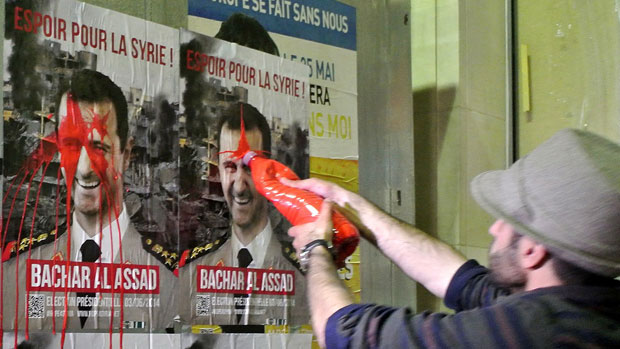Syria holds presidential elections as war rages on
Main opposition boycotts election, describing it as 'theatre written with the blood of Syrians'

A free daily email with the biggest news stories of the day – and the best features from TheWeek.com
You are now subscribed
Your newsletter sign-up was successful
Voting in Syria's presidential election takes place today, three years into a civil war in which more than 160,000 people have died.
There is little doubt that President Bashar al-Assad will win a third seven-year term in office and Syrian officials have gone to great lengths to present the vote as a way to resolve the crisis.
For the first time in the country's history there is more than one candidate competing for the top job. But Sherine Tadros, Middle East correspondent for Sky News, says the poll "is not about democracy, but rather a show of force by Assad".
The Week
Escape your echo chamber. Get the facts behind the news, plus analysis from multiple perspectives.

Sign up for The Week's Free Newsletters
From our morning news briefing to a weekly Good News Newsletter, get the best of The Week delivered directly to your inbox.
From our morning news briefing to a weekly Good News Newsletter, get the best of The Week delivered directly to your inbox.
The other two candidates – Maher Hajjar and Hassan al-Nouri – are not widely known and have little chance of winning. A restrictive election law makes it more or less impossible to run without government approval and the country's Supreme Court has already disqualified 21 candidates from the race.
"To vote for anything other than Bashar al-Assad is to sign your own death warrant and that of your family, and not to vote at all means you are forfeiting your chance of any kind of future in Syria," says Diana Darke in The Guardian.
Voting will only take place in government-held territory and opposition fighters have warned they will try to disrupt the vote. The Syrian National Coalition, the main opposition group, is boycotting the election, with its leader Ahmad al-Jarba describing the election as "theatre written with the blood of Syrians". He also accused Assad of planning to bomb and shell polling stations in order to blame the opposition.
Polling stations opened at 7.00am local time and will close at 7.00pm, although voting might be extended for five hours if there is a big turnout.
A free daily email with the biggest news stories of the day – and the best features from TheWeek.com
One in five Syrians have been left in abject poverty, with scarcely the means to meet their basic food needs, while millions of people have fled the country, with Syrians now the largest refugee population in the world.
-
 The ‘ravenous’ demand for Cornish minerals
The ‘ravenous’ demand for Cornish mineralsUnder the Radar Growing need for critical minerals to power tech has intensified ‘appetite’ for lithium, which could be a ‘huge boon’ for local economy
-
 Why are election experts taking Trump’s midterm threats seriously?
Why are election experts taking Trump’s midterm threats seriously?IN THE SPOTLIGHT As the president muses about polling place deployments and a centralized electoral system aimed at one-party control, lawmakers are taking this administration at its word
-
 ‘Restaurateurs have become millionaires’
‘Restaurateurs have become millionaires’Instant Opinion Opinion, comment and editorials of the day
-
 Epstein files topple law CEO, roil UK government
Epstein files topple law CEO, roil UK governmentSpeed Read Peter Mandelson, Britain’s former ambassador to the US, is caught up in the scandal
-
 Iran and US prepare to meet after skirmishes
Iran and US prepare to meet after skirmishesSpeed Read The incident comes amid heightened tensions in the Middle East
-
 Syria’s Kurds: abandoned by their US ally
Syria’s Kurds: abandoned by their US allyTalking Point Ahmed al-Sharaa’s lightning offensive against Syrian Kurdistan belies his promise to respect the country’s ethnic minorities
-
 Israel retrieves final hostage’s body from Gaza
Israel retrieves final hostage’s body from GazaSpeed Read The 24-year-old police officer was killed during the initial Hamas attack
-
 China’s Xi targets top general in growing purge
China’s Xi targets top general in growing purgeSpeed Read Zhang Youxia is being investigated over ‘grave violations’ of the law
-
 Syria’s Islamic State problem
Syria’s Islamic State problemIn The Spotlight Fragile security in prison camps leads to escape of IS fighters
-
 Panama and Canada are negotiating over a crucial copper mine
Panama and Canada are negotiating over a crucial copper mineIn the Spotlight Panama is set to make a final decision on the mine this summer
-
 Why Greenland’s natural resources are nearly impossible to mine
Why Greenland’s natural resources are nearly impossible to mineThe Explainer The country’s natural landscape makes the task extremely difficult